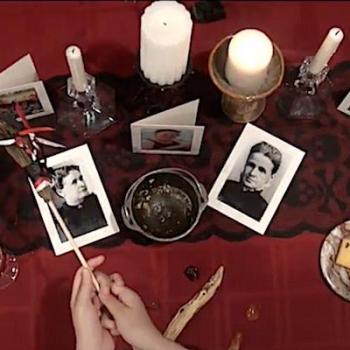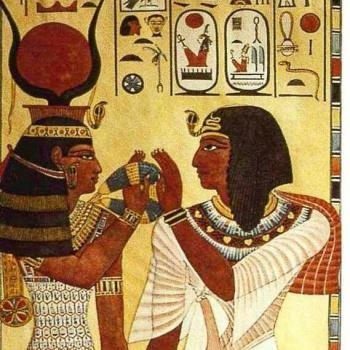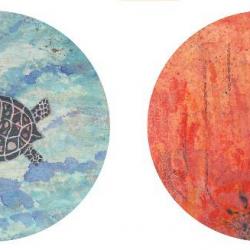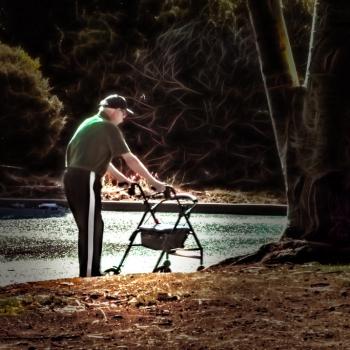Memoir – Samhain, All Souls, Day of the Dead. This time of year the veil between the living and mystery is thin and we remember our those who have gone before. Memory can lighten the burden of grief, create meaning, or create a container for the next chapter. What is your memoir? What is your story? We need your voice. In a voiced community we all flourish!
My mother raised my sister and me on stories. When I flip through our photo albums I see pictures of her telling stories. Children sit spellbound at her feet. We dreamed with myths and fairy tales, biography and classics, picture books, young adult, and novels. Eventually she added stories she herself had written.
She knew that stories were more than entertainment, more than “make-believe.” Stories serve as a mirror to our inner lives, with deep psychological resonance. They teach us and change us. In college I studied Carl Jung and learned that dreams fall into the same category. Our dreams are our personal myths and symbols hold archetypal truths. Renowned memoir author Terry Tempest Williams says, “Storytelling is the umbilical cord between the past, present, and future.”
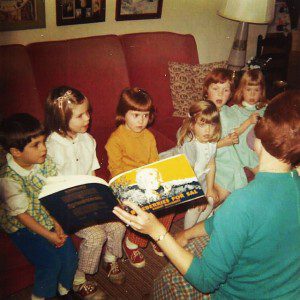
I learned from Mom. I listened. I listened to the stories, to what she meant to teach, and I listened to her life. Stephen Sondheim wrote about that brilliantly in the musical “Into the Woods.” His song, “Children will Listen” contains the words:
Careful the wish you make,
Wishes are children.
Careful the path they take-
Wishes come true,
Not free.
Careful the spell you cast,
Not just on children.
Sometimes the spell may last
Past what you see
And turn against you…
Careful the tale you tell,
That is the spell.
Children will listen.
I don’t mean to ask you to be so careful that your voice is silenced. The play introduces the song by instructing the young father to “Tell the story.” We need to tell the story from our own experience, our own truth, our own lives, with our own voice. As Terry Tempest Williams says, “One of the ironies of writing memoir is in using the “I” it becomes an alchemical “we.” This is the sorcery of literature. We write out of our humanity by writing through our direct experience.”
In order to leave behind our own stories we must find our voice. An interviewer asked if Terry Tempest Williams’ voice was heard. Her response? “That is not my concern. My concern, a question really, is, do I have the courage to speak? If I speak I believe someone will respond. It then becomes my responsibility to listen to that person. And in listening, together we create a space where people can be heard. It’s the conversation that I care most deeply about; this is the space I want to honor, respect, and protect. In a voiced community, we all flourish.”
As Mom became more well known as a teacher, people would approach her and confide, “I want to write a memoir!” “Great,” she would say “Tell me more!” and they would tell all about the amazing life Grandma lived, or Dad, or great Uncle Jacob. “I’m sure that story would be interesting,” she would say, “but it isn’t your story. Write your story, and Grandma, or Dad, or Uncle Jacob will be in it with you.” There’s an anecdote about the great poet William Stafford. He was at a reading, and had just finished sharing one of his poems when an audience member blurted: “I could have written that.” William replied, “but you didn’t.” Then he leaned forward and suggested, “You could write your own.”
Your story doesn’t simply flow onto the page, perfect, on the first try. The first story I wrote was “How the Pig Got It’s Curly Tail”. I barely remember those writing classes Mom taught us. We sat at the dining room table, number 2 pencils gripped in fierce fists, and wrote to her prompts. I still have that story, block letters on ruled paper with lots of cross-outs, typical 2nd grader fare.
I am grateful that she shared her love of story. I revel in the memories of long conversations about the bible and Shakespeare, my text books, and later, her books. I resent, but appreciate, dinners interrupted to check definitions in the dictionary, that led to more words, and more. Later, when I was in third grade, Mom carved out time from tending to our home and our childhood dramas, to write her own stories. Turn the page and Mom is getting short pieces published but I am an awkward sixth grader embarrassed that I am featured in some of her stories. Turn the page again, and I’m in college, coming out as a lesbian, and finding a love of earth-based spirituality, while she has started teaching writing. Turn the page to the next chapter. I have moved to the other side of the country to homestead and begin a career. Mom’s young adult books begin to get published. Turn the page again and while I learn to write sermons, Mom is my go to person. “Put more smells and colors and movement in it.” she would counsel. “Is that your voice or are you quoting? I want to experience it with you!” she urged. Now she trusted me to give her feedback on her drafts.
Some of those books gave me insights into her past. I saw her as an awkward teenager wishing someone would listen to her and a hesitant young woman breaking away from her family. Her whole life was a journey to find her voice and to use it. It is difficult to find out what your true voice really is. Turn more pages, and I am companioning her as she faces her death and is racing against time and cancer to publish her book of memoir that she has written over the years.
Her stories connect the past, the present, and the future. The tale that is told is the spell being cast.
“Children will Listen” asks:
What do you leave to your child when you’re dead?
Only whatever you put in its head
Things that your mother and father had said
Which were left to them too
Yes, we leave behind memories. Memories of what we said, what we did. We leave behind our stories and these stories both remind us of our love, which is the root of our grief. They also help us to bear that grief. Memories have flowed down from your many ancestors. Samhain is a time to listen for our ancestors. We must listen in order to hear their stories.
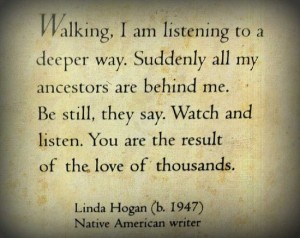 I feel all my ancestors within me. Listen, they say, you are the result of the stories of thousands.
I feel all my ancestors within me. Listen, they say, you are the result of the stories of thousands.
We invite you to find your voice. Your story is the only truly true story you can tell and only you can tell it.
Link to “Children Will Listen” by Stephen Sondheim, performed by Barbara Streisand







